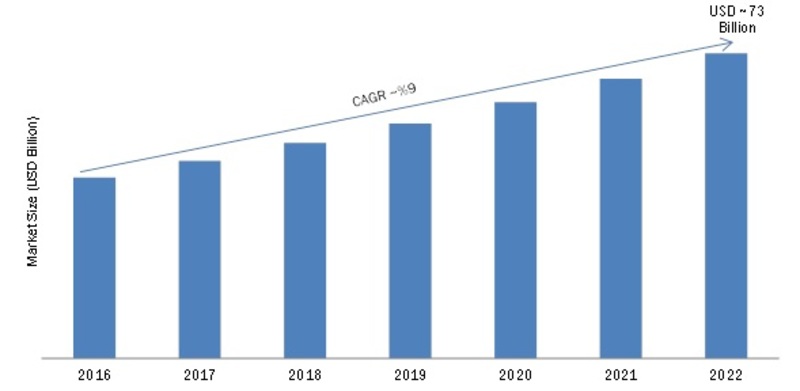Global Smart Factory Market
According to the report by Market Research Future (MRFR), the global smart factory market is poised to reach a substantial market valuation by 2023, expanding at a moderate 11.7% CAGR over the forecast period.
Drivers and Restraints
The higher adoption of robotic technology in industries and the development in the sensor technologies are some of the factors contributing to the growth of the global smart factory market over the review period. In addition to these, smart sensors are similarly able to track the position of assets, vehicles, inventory, and people; therefore, the data composed by smart sensors can be used by producers to track shipments and location of fleet trucks. These sensors also empower enterprises to supervise the movement of goods or machinery and the temperatures of the final product. These superior features offered by smart sensors are expected to increase the automation in smart factories, and consequently contribute towards the market growth over the review period.
On the other hand, risks related to cybersecurity and data loss are limiting the global smart factory market growth over the assessment period.
Get Free Sample Copy Report @ https://www.marketresearchfuture.com/sample_request/2317
Competitive Analysis
The major market players identified by MRFR in the global smart factory market include Siemens AG, General Electric Company (GE), ABB Ltd, Rockwell Automation, Schneider Electric, Honeywell International Inc., FANUC Corporation, Mitsubishi Electric Corporation, Emerson Electric Co., Johnson Controls International PLC, Yokogawa Electric Corporation, Atos SE, Robert Bosch GmbH, Cognex Corporation and Ubisense.
Segmental Analysis
The smart factory market is segmented on the basis of component, connectivity, services, and industry verticals.
Based on the components, the market has been bifurcated into hardware and software. The hardware segment includes control devices, industrial robots, sensors, machine vision systems, among others. Moreover, the segment is expected to acquire the fastest CAGR of 13.6% over the review period. Software segment comprises Distributed Control System (DCS), Enterprise Resource Planning (ERP), Supervisory Control and Data Acquisition (SCADA) Programmable Logic Controller (PLC), Programmable Automation Controller (PAC), and others.
On the basis of connectivity, the Smart Factory Market is segmented into wired connectivity and wireless connectivity. Based on services, the smart factory market has been bifurcated into managed services and professional services. The industry verticals operative in the global smart factory market is aerospace and defense, automotive, chemicals, electronics and semiconductors, healthcare and pharmaceuticals, and others.
Regional Analysis
On the basis of region, the global smart factory market has been segmented into Asia Pacific, North America, Europe, and the rest of the world.
The North American region is the largest regional market for smart factories and is estimated to lead the market share over the assessment period. This is attributed to the presence of multinational organizations with extensive investments in research and development activities for industrial automation and other advanced technologies such as Industrial Internet of Things (IIoT) and cloud technology. The presence of significant market players, along with established industries, is also expected to contribute towards the market share.
The Asia Pacific region is a potential market for smart factories and is also expected to witness substantial growth of the review period. This is attributed to the rapid industrialization in the emerging economies of the region, including India, China, South Korea, and Japan, among others. The increasing adoption of advanced technologies such as AI, automation, robotics, and others in the large industrial sectors in the region is the primary factor driving the growth.
Get Complete Report @ https://www.marketresearchfuture.com/reports/smart-factory-market-2317
Industry News
September 2019: NTT DOCOMO, a leading Japan-based mobile operator, announced that it became a member of the 5G Alliance for Connected Industries and Automation (5G-ACIA), aiming to expand the usage of 5G technology in the manufacturing sector.
September 2019: Ericsson, a leading provider of information and communication technology (ICT), incorporated smart manufacturing properties such as automation, cellular IoT and AI tools, in the company-owned factory in China, transforming it into a smart factory.
About Market Research Future:
At Market Research Future (MRFR), we enable our customers to unravel the complexity of various industries through our Cooked Research Report (CRR), Half-Cooked Research Reports (HCRR), Raw Research Reports (3R), Continuous-Feed Research (CFR), and Market Research & Consulting Services.
Media Contact
Company Name: Market Research Future
Contact Person: Abhishek Sawant
Email: Send Email
Phone: +1 646 845 9312
Address:Market Research Future Office No. 528, Amanora Chambers Magarpatta Road, Hadapsar
City: Pune
State: Maharashtra
Country: India
Website: https://www.marketresearchfuture.com/reports/smart-factory-market-2317

